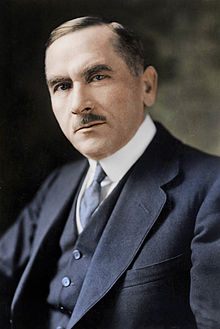Roman Dmowski

Roman Stanisław Dmowski (9 August 1864 – 2 January 1939) was a Polish politician, statesman, and co-founder and chief ideologue of the National Democracy (abbreviated "ND": in Polish, "Endecja") political movement. He saw the Germanization of Polish territories controlled by the German Empire as the major threat to Polish culture and therefore advocated a degree of accommodation with another power that had partitioned Poland, the Russian Empire. He favored the re-establishment of Polish independence by nonviolent means, and supported policies favorable to the Polish middle class. During World War I, in Paris, through his Polish National Committee he was a prominent spokesman, to the Allies for Polish aspirations. He was an instrumental figure in the postwar restoration of Poland's independent existence.
Quotes
[edit]- In relations with other nations, there is neither right nor wrong; there is only strength and weakness.
- Myśli nowoczesnego Polaka, 7th ed., 1953, p. 14.
- The nation becomes the master of its fate not only when it has many good sons, but also when it possesses enough strength to restrain its bad ones.
- "Podstawy polityki polskiej", Przegląd Wszechpolski (July 1905): 343, 349, 358-359.
- The only salvation for us is to stop being an incoherent, loose mob and to change into a strongly organized, disciplined army.
- "Walka o prawo i organizacja narodowa", Przegląd Wszechpolski, vol. 9 (June 1903).
- To be a Pole does not mean just to speak Polish or to feel close to other Poles, but to value the Polish nation above all else … [A Pole] must accept everything Polish, both good and bad, and must accept every period of the nation's history, both strong and weak.
- Myśli nowoczesnego Polaka, 7th ed., 1953, p. 26.
- Wherever we can multiply our forces and our civilizational efforts, absorbing other elements, no law can prohibit us from doing so, as such actions are our duty.
- Tomaszewski J. Kresy Wschodnie w polskiej myśli politycznej XIX i XX w.//Między Polską etniczną a historyczną. Polska myśl polityczna XIX i XX wieku.—T.6.—Warszawa, 1988.—S.101. Cited through: Oleksandr Derhachov (editor), "Ukrainian Statehood in the Twentieth Century: Historical and Political Analysis", 1996, Kiev
Quotes about Dmowski
[edit]- Some [Polish] nationalists like Stefan Kosicki, editor of the Gazeta Warszawaska, began calling for the expulsion of the Jews. Others went further. Already in December 1938 the daily Maty dziennik was calling for 'war' on the Jews, before 'the Jewish rope' strangled Poland. The National Democrat (Endek) leader Roman Dmowski prophesied an 'international pogrom of the Jews' which would bring an 'end to the Jewish chapter of history'. Nor was anti-Semitic violence purely verbal. There had already been pogroms in Wilno (Vilnius) in 1934, Grodno in 1935, Przytyk and Minsk in 1936 and Brzesc (Brest) in 1937. In 1936 Zygmunt Szymanowski, a professor of bacteriology at the University of Warsaw, was shocked by the conduct of Endek students in Warsaw and Lwôw, who assaulted Jewish students between lectures. In the mid-thirties, between one and two thousand Jews suffered injuries in attacks; perhaps as many as thirty were killed.
- Niall Ferguson, The War of the World: Twentieth-Century Conflict and the Descent of the West (2006), p. 270

